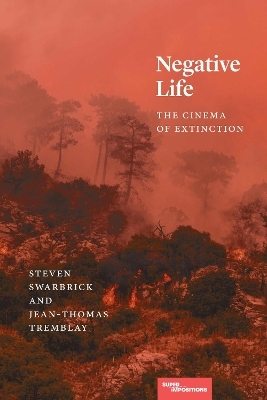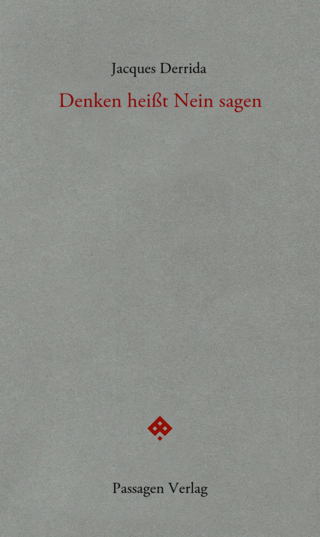
Negative Life
The Cinema of Extinction
Seiten
2024
Northwestern University Press (Verlag)
978-0-8101-4719-5 (ISBN)
Northwestern University Press (Verlag)
978-0-8101-4719-5 (ISBN)
Offering a bracing theoretical corrective to ecocriticism’s emphasis on pedagogies of care and interconnection, this book brings cinema studies, queer theory and psychoanalysis into novel configuration around a concept inherent to yet critical of life: negative life, a sundering of the connections between human and nonhuman relations.
How films help us understand the inevitable death of Earth and humanity
Offering a bracing theoretical corrective to ecocriticism’s emphasis on pedagogies of care and interconnection, Negative Life: The Cinema of Extinction brings cinema studies, queer theory, and psychoanalysis into novel configuration around a concept inherent to yet critical of life: negative life, a sundering of the connections between human and nonhuman relations. Engaging questions and challenges such as the nothingness of existentialism, the aversive side of sex, and the immanent exception of the drive in psychoanalysis, coauthors Steven Swarbrick and Jean-Thomas Tremblay not only counter ecocritical pieties but cut a new path for theory. They engage a unique corpus of films and philosophies that reject the pastoralism of “entanglement” or “enmeshment,” which have functioned as as an ethical and aesthetic alibi for extinction. Negative Life examines films by Julian PÖlsler, Kelly Reichardt, Lee Isaac Chung, Mahesh Matai, and Paul Schrader, which exemplify the existential contradictions that have intensified amid the sixth mass extinction; meanwhile, a set of interludes on the genre of ecohorror supplement this focus on negative life and the philosophers and theorists who express it. Each case study testifies formally and thematically to negative life as a structural condition of thought and film. Together, the titles that compose the titular cinema of extinction reveal the unlivable dimension of life and art, where form, desire, and nonbelonging tarry with the future-oriented promise of ecostudies—where all that lives connects. Negative Life militates against this promise, showing that faith in connection is a dead end.
How films help us understand the inevitable death of Earth and humanity
Offering a bracing theoretical corrective to ecocriticism’s emphasis on pedagogies of care and interconnection, Negative Life: The Cinema of Extinction brings cinema studies, queer theory, and psychoanalysis into novel configuration around a concept inherent to yet critical of life: negative life, a sundering of the connections between human and nonhuman relations. Engaging questions and challenges such as the nothingness of existentialism, the aversive side of sex, and the immanent exception of the drive in psychoanalysis, coauthors Steven Swarbrick and Jean-Thomas Tremblay not only counter ecocritical pieties but cut a new path for theory. They engage a unique corpus of films and philosophies that reject the pastoralism of “entanglement” or “enmeshment,” which have functioned as as an ethical and aesthetic alibi for extinction. Negative Life examines films by Julian PÖlsler, Kelly Reichardt, Lee Isaac Chung, Mahesh Matai, and Paul Schrader, which exemplify the existential contradictions that have intensified amid the sixth mass extinction; meanwhile, a set of interludes on the genre of ecohorror supplement this focus on negative life and the philosophers and theorists who express it. Each case study testifies formally and thematically to negative life as a structural condition of thought and film. Together, the titles that compose the titular cinema of extinction reveal the unlivable dimension of life and art, where form, desire, and nonbelonging tarry with the future-oriented promise of ecostudies—where all that lives connects. Negative Life militates against this promise, showing that faith in connection is a dead end.
Steven Swarbrick is an assistant professor of English at Baruch College, City University of New York. He is the author of The Environmental Unconscious: Ecological Poetics from Spenser to Milton. Jean-Thomas Tremblay is an assistant professor of environmental humanities at York University. They are the author of Breathing Aesthetics.
Preface
Introduction Ecocriticism against The Wall
Chapter 1 First Cow at the End of the World
Interlude The Horror of Entanglement I: Annihilation, In the Earth
Chapter 2 Familiar Afterlives in Minari and Bhopal Express
Interlude The Horror of Entanglement II: Antichrist, Lamb, X
Chapter 3 The Queer Impossibility of First Reformed
Acknowledgments
Notes
References
Illustration Credits
Index
| Erscheinungsdatum | 22.08.2024 |
|---|---|
| Reihe/Serie | Superimpositions |
| Zusatzinfo | 54 halftones |
| Verlagsort | Evanston |
| Sprache | englisch |
| Maße | 152 x 229 mm |
| Themenwelt | Kunst / Musik / Theater ► Film / TV |
| Geisteswissenschaften ► Philosophie ► Erkenntnistheorie / Wissenschaftstheorie | |
| Geisteswissenschaften ► Sprach- / Literaturwissenschaft ► Anglistik / Amerikanistik | |
| Geisteswissenschaften ► Sprach- / Literaturwissenschaft ► Literaturwissenschaft | |
| Sozialwissenschaften ► Kommunikation / Medien ► Medienwissenschaft | |
| ISBN-10 | 0-8101-4719-X / 081014719X |
| ISBN-13 | 978-0-8101-4719-5 / 9780810147195 |
| Zustand | Neuware |
| Informationen gemäß Produktsicherheitsverordnung (GPSR) | |
| Haben Sie eine Frage zum Produkt? |
Mehr entdecken
aus dem Bereich
aus dem Bereich
die Grundlegung der modernen Philosophie
Buch | Softcover (2023)
C.H.Beck (Verlag)
18,00 €


